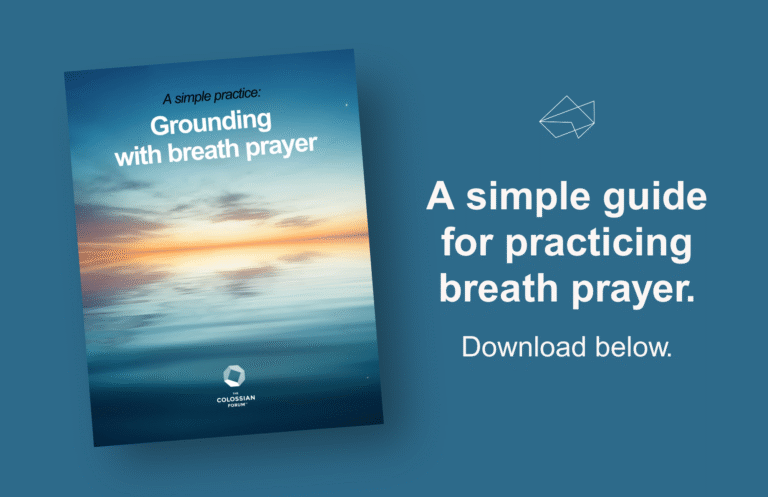We’re often told to manage conflict with strategy…
…But rarely are we invited to engage it with presence. What if, instead of reacting out of fear or frustration, we could respond from a grounded place of love?
In this powerful reflection, counselor and spiritual director Dr. Chuck DeGroat offers a deeply personal glimpse into what Christian conflict transformation looks like when we pay attention to our bodies. His story reveals how spiritual formation and nervous system awareness can help us stay rooted in love — even when emotions run high. It’s a hopeful reminder that healing often begins not with fixing others, but by finding calm within ourselves.
In this post, you will read an excerpt (in purple text) from Chuck DeGroat about a time he experienced conflict, how he chose to breathe through it with grace, and what conflict like this has taught him about spiritual formation.
When Conflict Feels Familiar
|
“My heart lurches and my body becomes alert to a familiar experience. I sit in a room with colleagues who are in the midst of an intense disagreement. Anger and anxiety have reached a fevered pitch. I care for these people deeply, and sometimes that has a tendency to bring the tension even higher.” We’ve all been there — stuck in a room where tension hums in the air. Maybe the disagreement isn’t even about us, but our bodies still tighten, our minds race, and the moment feels strangely personal. For Chuck, the experience of sitting between colleagues in conflict broughtback something deeper: not just professional stress, but an echo of long-buried childhood memories. This is where the work of Christian conflict transformation begins — not with fixing the external situation, but by noticing what’s rising within. The Body Remembers“I feel this tension in my chest, in my stomach. Here is where my body reconnects with a long-time, all-too-familiar story. It’s a story that goes back to childhood, where Mom and Dad’s fights left me ping-ponging between fight and flight. I didn’t feel safe then, and it’s so easy to spiral into feeling that same unsafe feeling here and now with my colleagues.” When we encounter conflict, our bodies often respond faster than our minds. A racing heart, clenched stomach, or tight chest might seem irrational in the moment — but those reactions are rooted in past experiences our nervous systems haven’t forgotten. For Chuck, the anxiety of present-day tension tapped into painful childhood memories. Our reactions in conflict aren’t always just about what’s happening now — they’re often shaped by what has happened before. Naming those patterns is one of the first steps toward healing. A New Response: Grounding in Conflict“I could lash out, shut others down, or I could disappear into myself and try to become as small as possible. In fact, I did this for years. I would bring my own reactivity to these kinds of conflict, and my nervous system was perpetually reliving the past. But in this moment, situated between my quarreling colleagues, I place my hand on my heart to soothe its beating. I breathe slowly. I listen for God’s kind voice, knowing that God dwells at the center of each of us. I acknowledge my feet placed on the office floor. I find the grounding within to engage this present moment courageously. From here, I am able to ask a thoughtful question and to truly hear what the other person is saying.” Once we become aware of our internal patterns, we’re faced with a choice: will we repeat them, or will we respond differently? Chuck’s instinct — like many of ours — is to either lash out or shrink back. But in this moment, he chooses neither. Instead, he turns to a simple grounding practice. By placing a hand on his heart, noticing his feet, and breathing slowly, he reorients himself in the present. This shift, though small, is deeply spiritual. It’s an act of reclaiming agency, welcoming God’s presence, and stepping into the moment with grace rather than fear. Spiritual Formation and Nervous System Awareness“I learned years ago that we can’t connect with one another in fight or flight. Real connection between people is only possible when our nervous systems sense safety. I’m learning, slowly and through practice, that cultivating inner safety and calm makes it possible to show up in hard conversations with grace.” As Chuck reminds us, authentic connection isn’t possible when our nervous systems are in survival mode. If we want to lead with wisdom and compassion, we need to cultivate a sense of safety — not just for others, but within ourselves. This is why spiritual formation must include embodied practices. We can’t think or theologize our way out of conflict if our bodies are bracing for danger. Grounding practices, breath prayer, and attention to our internal experience allow us to show up more fully, more calmly, and more faithfully. Becoming Rooted and Grounded in Love“It has taken time to understand my body’s story, to discern my primal reactions to tension… And it’s taken time to quiet the inner storms that seem to brew every time conflict arises. That’s work we’re all invited to. Part of maturing is becoming more and more ‘rooted and grounded in love,’ as St. Paul says (Ephesians 3:17).” Transformation doesn’t happen overnight. And it doesn’t happen without a willingness to look inward. In this final reflection, Chuck describes the long, slow work of healing — understanding the internal patterns that keep us stuck, and practicing new habits that reflect God’s love. This is the slow, sacred work of becoming more like Christ: not just knowing the truth, but being grounded in it. It’s what the Apostle Paul meant whenhe prayed that we would be “rooted and grounded in love.” For leaders weary from constant tension, Chuck’s invitation is gentle but clear — your own inner life matters, and healing is possible. Meet the Author
Chuck DeGroat (PhD, LPC) is Professor of Counseling and Christian Spirituality at Western Theological Seminary and Executive Director of its Clinical Mental Health Counseling Program. He is the author of Healing What’s Within: Coming Home to Yourself and to God When You’re Weary, Wounded, and Wandering. Learn more at chuckdegroat.net. Want more reflections like this?
|


